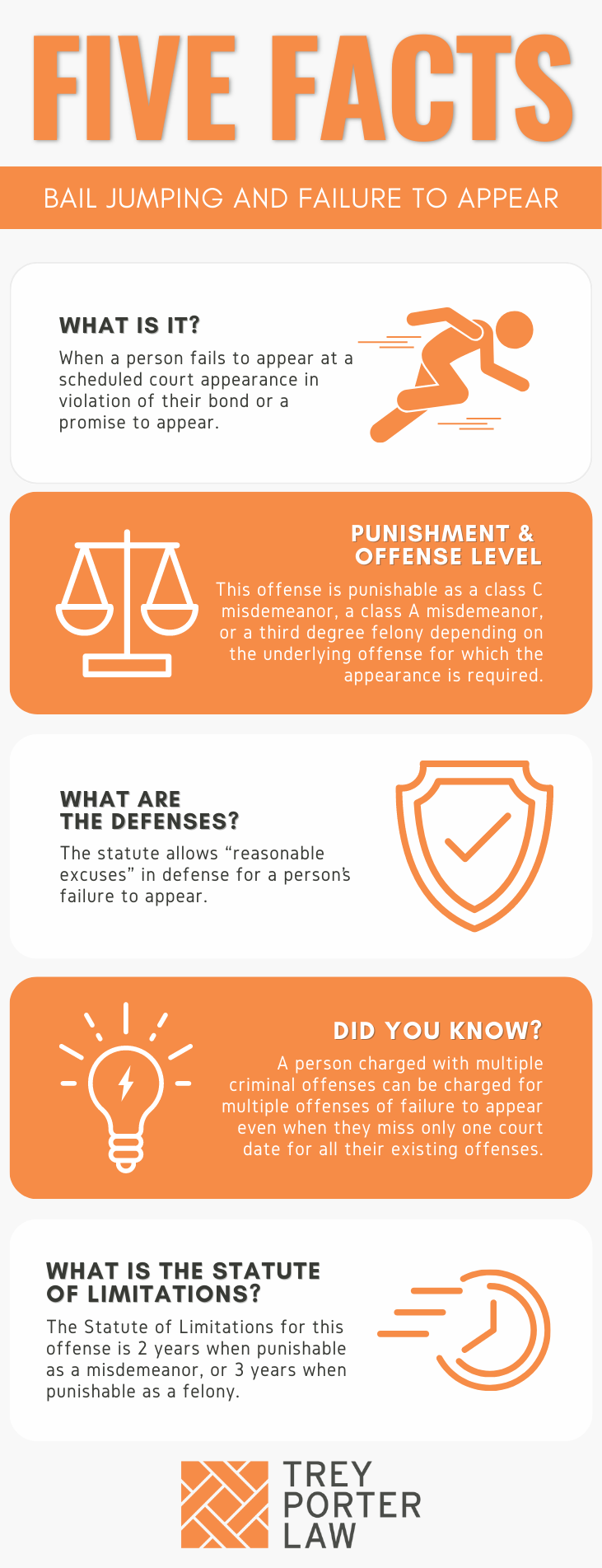WHAT IS BAIL JUMPING AND FAILURE TO APPEAR IN TEXAS?
The Texas law against bail jumping or failure to appear prohibits refusing to appear when required to do so after being released from custody.
WHAT IS THE BAIL JUMPING AND FAILURE TO APPEAR LAW IN TEXAS?
Tex. Penal Code § 38.10. BAIL JUMPING AND FAILURE TO APPEAR.
(a) A person lawfully released from custody, with or without bail, on condition that he subsequently appear commits an offense if he intentionally or knowingly fails to appear in accordance with the terms of his release.
(b) It is a defense to prosecution under this section that the appearance was incident to community supervision, parole, or an intermittent sentence.
(c) It is a defense to prosecution under this section that the actor had a reasonable excuse for his failure to appear in accordance with the terms of his release.
(d) Except as provided in Subsections (e) and (f), an offense under this section is a Class A misdemeanor.
(e) An offense under this section is a Class C misdemeanor if the offense for which the actor’s appearance was required is punishable by fine only.
(f) An offense under this section is a felony of the third degree if the offense for which the actor’s appearance was required is classified as a felony.
WHAT IS THE PENALTY CLASS FOR BAIL JUMPING AND FAILURE TO APPEAR IN TEXAS?
The penalty classification for bail jumping or failing to appear corresponds to the offense for which a person’s appearance is required. If the person fails to appear for a Class C misdemeanor or other offense punishable by fine only, the bail jumping and failing to appear is a Class C misdemeanor.
If the offense for which the person fails to appear is a felony, bail jumping is a third degree felony, punishable by two to ten years in prison. In all other circumstances, bail jumping and failing to appear is a Class A misdemeanor, punishable by up to one year in county jail.
WHAT IS THE PUNISHMENT RANGE FOR BAIL JUMPING AND FAILURE TO APPEAR IN TEXAS?
A person charged with third degree felony bail jumping or failing to appear faces between two and ten years in prison, and a maximum $10,000 fine. Bail jumping or failure to appear charged as a Class A misdemeanor carries up to one year in jail, and a maximum $4,000 fine. If charged as a Class C misdemeanor, it is punishable by a maximum fine of $500.
WHAT ARE THE PENALTIES FOR BAIL JUMPING AND FAILURE TO APPEAR IN TEXAS?
A person charged with bail jumping or failure to appear may be eligible for probation after a conviction, or deferred adjudication without a conviction. The maximum term of community supervision for third degree felony bail jumping or failing to appear is ten years. The community supervision term for a Class A misdemeanor may not exceed two years, and may be up to 180 days for a Class C misdemeanor.
WHAT ARE THE DEFENSES TO BAIL JUMPING AND FAILURE TO APPEAR IN TEXAS?
The statute does not authorize specific defenses to bail jumping or failing to appear. A person accused thereof may attempt to negate at least one of the elements the State must prove at trial.
WHAT IS THE STATUTE OF LIMITATIONS FOR BAIL JUMPING AND FAILURE TO APPEAR IN TEXAS?
The limitation period for third degree felony bail jumping or failure to appear is three years. For bail jumping categorized as a Class A or Class C misdemeanor, the limitation period is two years.
BAIL JUMPING AND FAILURE TO APPEAR IN TEXAS
The purpose of the law against bail jumping is to ensure a person is physically present for trial and other required court appearances for a pending criminal charge. A bail bond is a promise to appear, and a person may be charged for refusing to appear after each conditional release.
TEXAS BAIL JUMPING AND FAILURE TO APPEAR COURT CASES
The case law regarding bail jumping and failing to appear in Texas shows that courts construe the statute broadly. Failing to report to a court setting or other specified location, such as a county jail after a bond revocation hearing, constitutes bail jumping.
- In Timmins v. State, the defendant’s bond was revoked when he appeared in court, but the judge who revoked his bond let him escort his mother home before reporting to the jail. He failed to report to the jail, and was charged and convicted of bail jumping. The Texas Court of Criminal Appeals affirmed his conviction. The defendant had been released from custody, and committed the offense of bail jumping or failure to appear when he did not report to the jail.
- In Kuykendall v. State, the defendant was on bond for two offenses, and was required to appear on the same date to the same courtroom for both charges. After he knowingly failed to appear, he was convicted of two bail jumping charges in addition to his original offenses.
The Court of Criminal Appeals affirmed, holding the “allowable unit of prosecution” is the “number of discrete conditional releases” for which a person is required to appear and failed to do so. Although he only missed one court date, two bail jumping convictions were proper because he was on two separate conditional releases.













